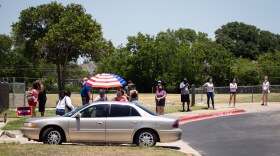A Texas couple was forced into a tough position on Election Day: quarantine — as instructed by Travis County public health officials — or vote in Tuesday’s primary runoff elections and take the chance of infecting others.
Linda Harrison and Vernon Webb were diagnosed with COVID-19 last week. Harrison said she has been wracked with a cough, congestion and intense fatigue. Her husband has slept most of the last two weeks.
The two still wanted to vote. Harrison said they vote in every election, even the local ones. But she said Travis County health officials contacted them and asked them to quarantine through the election.
Not only that but the evening before the election, she found out her COVID-19 test results wouldn’t be enough to qualify for an emergency absentee ballot — she needed a certified doctor’s note — and Harrison’s doctor was out.
The two couldn’t vote by mail either, because the deadline to register was July 2, before they were diagnosed.
“How many people are in this situation?” said Harrison, “We cannot be the only ones.”
About 68,000 other Texans were diagnosed with the disease since July 2. Elections advocates said they heard from about a half dozen but suspect many more.
“I just think it’s ridiculous in this day and age that we can’t say, ‘this is the situation going on with me and I need a ballot so I can exercise my right to vote,’” Harrison said.
Harrison reached out to the Texas Civil Rights Project, which sued Travis County on behalf of the couple. The injunction was denied Tuesday afternoon.
“The state of Texas has thrown up roadblock after roadblock to make voting more difficult,” said Mimi Marziani, TCRP President. “This is what voter suppression looks like in the year 2020. It is death by 1000 cuts.”
Finally, Harrison was able to find a doctor to fill out the certification before polls closed at 7 p.m. Her husband did not. All the exhausted 62-year-old pediatric nurse had to do was drive 30 minutes to fill out the ballot with a Texas Civil Rights Project worker, who picked it up for her in a parking lot between a Sonic and a Taco Bell.
“I’m going to put the ballot on the hood of her car while she gets out to fill out her ballot,” said Katya Ehresman with the Texas Civil Rights Project.
Harrison asked her a few questions through her car window as she filled out the ballot.
“I think you should seal it,” Ehresman told Harrison, “Just make sure to sign the back of the white one.”
Now — sealed and completed ballot in hand — Erehensen set off for the County Clerk, with only an hour to go before polls close. By the time she arrived, there was only 11 minutes left.
She wrapped the ballot in a t-shirt because she didn’t have gloves. She found the line and waited.
“Hi, this is an emergency ballot,” Ehresman told county clerk employees, “It was someone with COVID-19 that touched it so I would be careful. That’s why I was using the shirt.”
With four minutes to spare, Travis County accepted it.
“The fact that I kept at it and kept at it is the only reason I got to send my ballot in,” said Harrison.
Her vote made it, but she had lawyers, and she decided she wasn’t going to take no for an answer. What about the people that didn’t?
Many local elected officials across Texas pushed the state to allow all voters to have access to mail-in ballots over COVID concerns. Initially, a federal district judge in San Antonio approved a deal that would allow anyone who wanted one to vote by mail. Ultimately, the idea was struck down in a federal appeals court last month.
Gov. Abbott and Attorney General Ken Paxton have continued to block efforts to expand vote-by-mail. It doesn’t appear it will change before November.
Paul Flahive can be reached at Paul@tpr.org and on Twitter at @paulflahive.
TPR was founded by and is supported by our community. If you value our commitment to the highest standards of responsible journalism and are able to do so, please consider making your gift of support today.
Copyright 2020 Texas Public Radio. To see more, visit Texas Public Radio. 9(MDA3MzEzNjc2MDEzMDI2Mzc4OTc4NTFmNg001))



